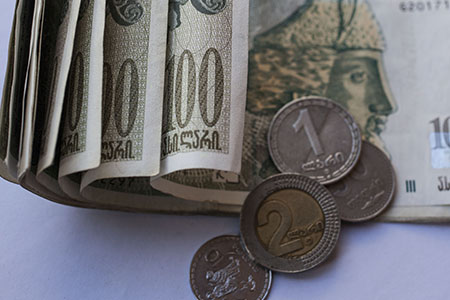Election expectations influence GEL rate, says National Bank

"At this stage, the impact of external shocks on the national currency is over”, says the National Bank of Georgia (NBG).
In a special statement today the Bank offered more details about its decision to sell of $40 million US dollars at the Foreign Exchange Auction yesterday.
The Bank sold the US dollars to control the changing value of the Georgian Lari (GEL) against the US dollar.
At this stage the impact of external shocks on the national currency is over and the fluctuation of the exchange rate is caused by temporary factors [such as] several large transactions, plus the pre-election expectations,” said NBG.
The recent interventions have been made just to mitigate the short-term fluctuations. Such interventions have been made in the past and will be made in the future as well. Though, this does not mean NBG will interfere in any fluctuation,” the Bank added.
Yesterday NBG sold $40 million USD at the Foreign Exchange Auction to try curb depreciation of the Georgian Lari (GEL) against the US dollar.
Through the bank’s actions, the Lari gained value. Today’s rate saw 1 USD equal 2.3276 GEL, while yesterday 1 USD equalled 2.3345 GEL.
Meanwhile today 1 Euro cost 2.6174 GEL, down from the previous rate of 2.6247 GEL.
The main goal of the Foreign Exchange Auction is to fill international reserves, to eliminate the pressure on the exchange rate due to high temporary inflows of foreign capital or to balance the private and government gap,” said NBG in its Monetary Policy Strategy published on the Bank’s webpage since 2013.
To keep the country’s foreign exchange reserves at a stable level, NBG periodically intervened on the foreign exchange market and purchased (or sold) foreign currency.
It must be noted that this intervention increases the money supply. If intervention creates inflationary risks, NBG conducts sterilisation via open market operations,” said the Bank.
Furthermore, Government operations carried out in a foreign currency also created the need to intervene in the foreign exchange market, said NBG.
NBG represents the Government’s banker therefore Government accounts are opened in the National Bank. Hence, the inflows and outflows of Government funds are managed through the NBG and Government accounts bypass the foreign exchange market.
As a result of this, despite the country’s balanced Balance of Payments, the private sector might have a negative foreign balance and the state a positive balance. In this case, to balance the gap the National Bank of Georgia will sell foreign currency via a Foreign Exchange Auction and vice versa,” the Bank said.
 Tweet
Tweet  Share
Share